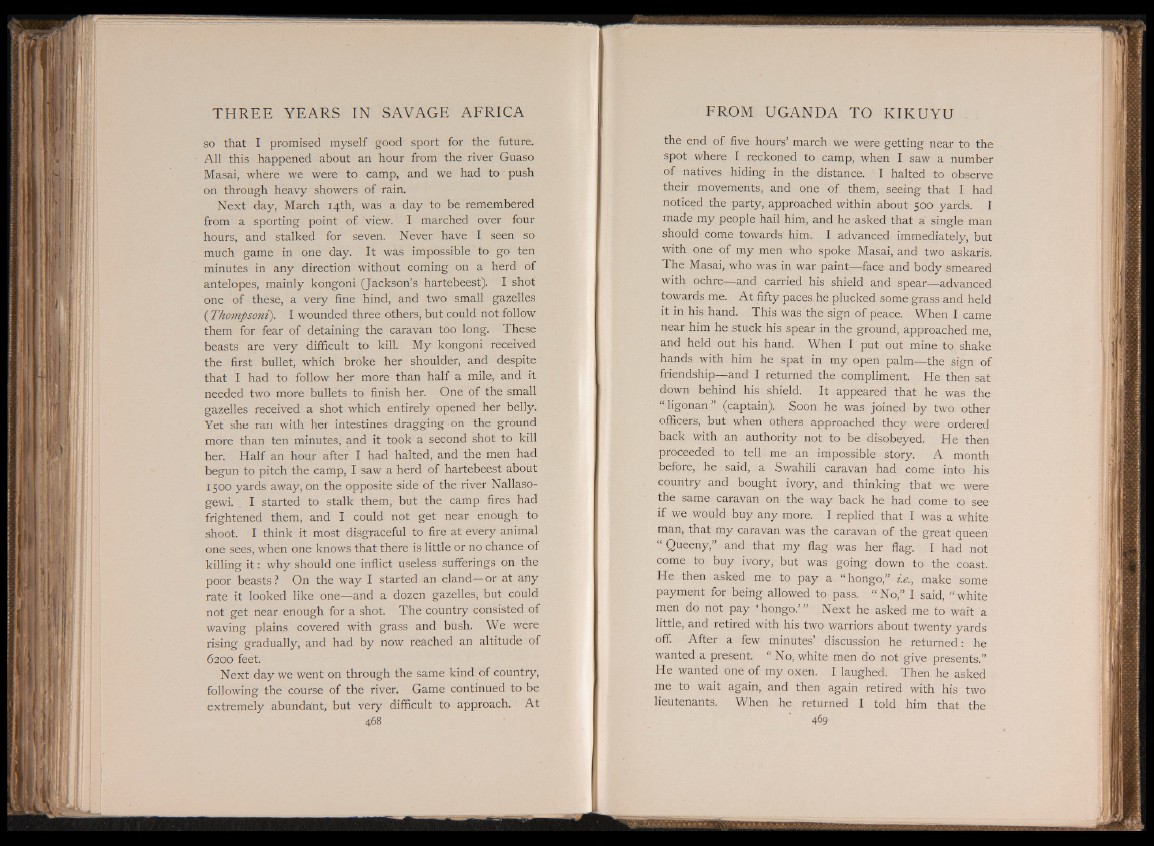
so that I promised myself good sport for the future.
All this happened about an hour from the river Guaso
Masai, where we were to camp, and we had to f push
on through heavy showers of rain.
Next day, March 14th, was a day to be remembered
from a sporting point of view. I marched over four
hours, and stalked for seven. Never have I seen so
much game in one day. It was impossible to go ten
minutes in any direction without coming on a herd of
antelopes, mainly kongoni (Jackson’s hartebeest). I shot
one of these, a very fine hind, and two small gazelles
( Thompsoni). I wounded three others, but could not follow
them for fear of detaining the caravan too long. These
beasts are very difficult to kill. My kongoni received
the first bullet, which broke her shoulder, and despite
that I had to follow her more than half a mile, and it
needed two more bullets to finish her. One of the small
gazelles received a shot which entirely opened her belly.
Yet she ran with her intestines dragging on the ground
more than ten minutes, and it took a second shot to kill
her. Half an hour after I had halted, and the men had
begun to pitch the camp, I saw a herd of hartebeest about
1500 yards away, on the opposite side of the river Nallaso-
gewi. I started to stalk them, but the camp fires had
frightened them, and I could not get near enough to
shoot. I think it most disgraceful to fire at every animal
one sees, when one knows that there is little or no chance of
killing i t : why should one inflict useless sufferings on the
poor beasts ? On the way I started an eland—or at any
rate it looked like one—and a dozen gazelles, but could
not get near enough for a shot. The country consisted of
waving plains covered with grass and bush. We were
rising gradually, and had by now reached an altitude of
6200 feet.
Next day we went on through the same kind of country,
following the course of the river. Game continued to be
extremely abundant, but very difficult to approach. At
the end of five hours’ march we were getting near to the
spot where I reckoned to camp, when I saw a number
of natives hiding in the distance. I halted to observe
their movements, and one of them, seeing that I had
noticed the party, approached within about 500 yards. I
made my people hail him, and he asked that a single man
should come towards him. I advanced immediately, but
with one of my men who spoke Masai, and two askaris.
The Masai, who was in war paint—face and body smeared
with ochre—and carried his shield and spear-Sadvanced
towards me. At fifty paces he plucked some grass and held
it in his hand. This was the sign of peace. When I came
near him he stuck his spear in the ground, approached me,
and held out his hand. When I put out mine to shake
hands with him he spat in my open palm—the sign of
friendship—and I returned the compliment. He then sat
down behind his shield. It appeared that he was the
“ ligonan” (captain). Soon he was joined by two other
officers, but when others approached they were ordered
back with an authority not to be disobeyed. He then
proceeded to tell me an impossible story. A month
before, he said, a Swahili caravan had come into his
country and bought ivory, and thinking that we were
the same caravan on the way back he had come to see
if we would buy any more. I replied that I was a white
man, that my caravan was the caravan of the great queen
“ Queeny,” and that my flag was her flag. I had not
come to buy ivory, but was going down to the coast.
He then asked me to pay a “ hongo,” z.&.t make some
payment for being allowed to pass. “ No,” I said, “ white
men do not pay ‘ hongo.’ ” Next he asked me to wait a
little, and retired with his two warriors about twenty yards
off. After a few minutes’ discussion he returned: he
wanted a present. “ No, white men do not give presents.”
He wanted one of my oxen. I laughed. Then he asked
me to wait again, and then again retired with his two
lieutenants. When he returned I told him that the
469